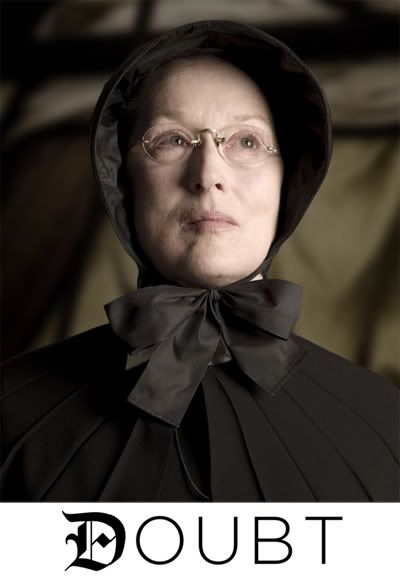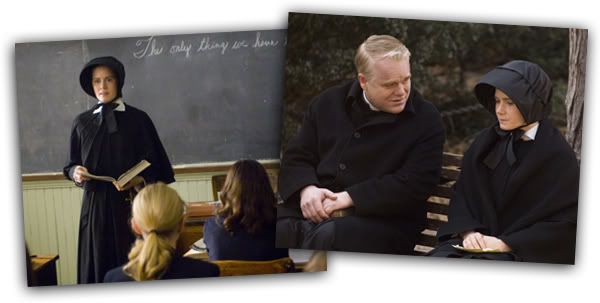
The movie was actually adapted from a Pulitzer Prize winning play by John Patrick Shanley. It’s set in the early 60s in a Catholic school in the Bronx, run by a team of nuns. The principal, Sister Aloysius, stands in competition with a priest, Father Flynn. Sister Aloysius is a stern, traditional type, who doesn’t take any crap, while Father Flynn is the “people’s” leader. He wants to be one of the crowd, the school children’s best friend, and connector to the community. He wants to modernize the school and the church, while she likes to rule “by the book.” This introduces the conflict, and then something happens . . . or doesn’t happen. We’re not quite sure. It’s sort of quicksand, the more you try to move toward the truth, the faster you sink—away from any resolution.

 I remember learning in my high school psychology class about the flexibility and inconsistency of the memory. I’m sure there were certain terms for the things I’m about to describe, but unfortunately, I can’t remember them (memory=fallible: case in point). We talked about an instance where there was a car accident with several witnesses. Having so many people to recreate the event should make it easier to come up with what really took place; however, this was not the case. One witness saw a driver signal, another witness said there was no such signal. One witness said the other driver tried to swerve, another said the driver deliberately barreled through the intersection. One witness said there was only the sound of busting glass, another said there was a scream and a shatter, and still another remembers only a honking horn. And the list of inconsistencies goes on and on.
I remember learning in my high school psychology class about the flexibility and inconsistency of the memory. I’m sure there were certain terms for the things I’m about to describe, but unfortunately, I can’t remember them (memory=fallible: case in point). We talked about an instance where there was a car accident with several witnesses. Having so many people to recreate the event should make it easier to come up with what really took place; however, this was not the case. One witness saw a driver signal, another witness said there was no such signal. One witness said the other driver tried to swerve, another said the driver deliberately barreled through the intersection. One witness said there was only the sound of busting glass, another said there was a scream and a shatter, and still another remembers only a honking horn. And the list of inconsistencies goes on and on.Then we learned something even more disturbing, that memories can be shaped over time. You may remember an instance a certain way one year after it’s occurred and then another way five years after that, depending on what happens in your life, how people talk with you about the event, and many, many other factors. There are so many things I remember about my childhood, sometimes it makes me stop and wonder which things really happened the way I remember them, and which have been somehow changed by time and circumstance in my own mind.

 I was listening to one of my favorite radio shows (This American Life) the other day and heard a story that perfectly illustrates this point. It was a broadcast about origin stories. (The one I’m talking about is Act I: Mad Man, which comes after a short introduction, if you’d like to hear it. Click on this link. The story begins at minute 8:47.) In this section of the show, a girl tells the story of her father’s advertising career—and how his former partner succeeds in getting the credit for most of his important contributions to that field. Somehow this man has convinced himself that he in fact was the inspiration behind another person’s ads, even to go so far as to create little anecdotes to go along with how he came up with these innovative advertizing ideas. Is he really deluded or is he just an evil, conniving, credit-swiping dirtbag? You be the judge.
I was listening to one of my favorite radio shows (This American Life) the other day and heard a story that perfectly illustrates this point. It was a broadcast about origin stories. (The one I’m talking about is Act I: Mad Man, which comes after a short introduction, if you’d like to hear it. Click on this link. The story begins at minute 8:47.) In this section of the show, a girl tells the story of her father’s advertising career—and how his former partner succeeds in getting the credit for most of his important contributions to that field. Somehow this man has convinced himself that he in fact was the inspiration behind another person’s ads, even to go so far as to create little anecdotes to go along with how he came up with these innovative advertizing ideas. Is he really deluded or is he just an evil, conniving, credit-swiping dirtbag? You be the judge.So, if it’s difficult to pin down the truth of a matter even if you see it with your own eyes, hear with your own ears, and experience it firsthand, how can you expect to find it without those things? It seems impossible. The doubt begins to creep up, and the waffling begins: back and forth, back and forth, irritating, like the squeak of a see-saw.
I suppose that’s just the nature of things. With our five senses, we go through that cycle of experiencing something and then interpreting that experience over and over again. And out of those interpretations spring conclusions, beliefs, certainties. We can’t help it; it happens unconsciously most of the time. Right now, you’re forming opinions about the kind of person I am just by reading this sentence. Somewhat akin to another great play, Twelve Angry Men by Reginald Rose (rent the '57 version with Henry Fonda).
I watched an interview with Shanley on the web, and he said that he gets tons of emails, people pleading for him to announce who was right: Sister Aloysius or Father Flynn. He said he will never tell. That to give that vital piece of information away would be to rob you of the very experience you want to have as a spectator. The last act of the play, he explained, actually takes place outside of the theater, in the living room or around the kitchen table as people debate this issue. As people explore their doubts. And it’s true. That’s exactly what the DH and I did, and guess what—we couldn’t agree on what really happened. But at the same time, neither one of us could really be sure. Isn’t that something?

4 comments:
Great post. It was funny how we got done with the movie and I was sure of what happened and you were sure something else happened!
Agreed, great post!!
When I first saw that picture, I thought it was Katherine Brooke, and that this was going to be a post about Anne of Avonlea.
So sad that I even know that.
We saw Doubt up at Pioneer Theater Company in Salt Lake. It was So Good. I really loved it. Hard to watch. But loved it. We haven't seen the movie yet.
Post a Comment